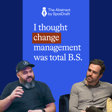
Ep 37: IPO, Acquisitions & Board Membership: Nithya Das, Chief Legal & Administrative Officer, Diligent
How can legal leaders thrive while navigating major M&A and capital market transactions? How do you expand the GC or CLO title and take on broader executive roles? And how do you leverage your experience into a board seat?
Nithya Das, Chief Legal and Chief Administrative Officer at Diligent, has taken on each of these challenges and used the lessons she gained from them to advance her career exactly where she wants it to go. Formerly the chief legal and people officer of the so-called “AppNexus mafia” during the startup’s historic sale to AT&T, Nithya has led counsel, operations, and more in the ad tech, food tech, and reg tech spaces. She also brings her expertise to her seat on the board of directors at Outbrain.
Hear Nithya as she shares tips about leading in-house counsel through IPO and acquisitions, serving on a board of directors, dealing with personal tragedy during career triumphs, the importance of transparency for establishing trust and loyalty with your team, and more.
Diligent is the leading GRC SaaS company, empowering more than 1 million users and 700,000 board members and leaders to make better decisions, faster. The Diligent One Platform helps organizations connect their entire GRC practice — including governance, risk, compliance, audit and ESG — to bring clarity to complex risk, stay ahead of regulatory changes and deliver impactful insights, in one consolidated view.
Diligent will be at CLOC global institute next month! Be sure to catch their speaking session 'Elevating Entity Management' on the 7th and stop by booth 104 to discuss the ways Diligent can help streamline and automate your entity management at scale.
Read detailed summary: https://www.spotdraft.com/podcast/episode-37
Annual Compensation Report: https://salary-report.spotdraft.com/
Topics:
Introduction: 0:00
Planting the seeds of your legal career: 3:36
Moving into your first in-house role at AppNexus: 4:47
Running the IPO and acquisition process as GC at AppNexus: 8:29
Choosing to move on from AT&T after acquisition: 10:43
Taking time off before joining Olo as COO and CLO: 16:02
Running operations at Olo: 20:12
Offering practical advice to lawyers trying to take on business roles: 25:10
Working with private equity versus working in a public company: 27:47
Leading legal at Diligent: 29:58
Finding your way onto the board at Outbrain: 31:53
What you wish you had known as a young lawyer: 35:52
Connect with us:
Nithya Das - https://www.linkedin.com/in/nithyadas/
Tyler Finn - https://www.linkedin.com/in/tylerhfinn
SpotDraft - https://www.linkedin.com/company/spotdraft
SpotDraft is a leading CLM platform that solves your end-to-end contract management issues. Visit https://www.spotdraft.com to learn more.



















